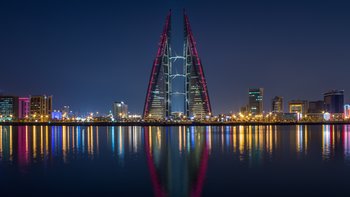What are Oman’s barriers to being a leading tech start up center?
- Oman is increasingly building the institutional foundations and addressing funding gaps which remain challenges to its startup ecosystem and others across the MENA
- To complete regionally, Oman should embrace significant underexploited opportunities in travel tech, augmented reality, agtech, and 4IR technologies
Computer Weekly spoke with Tahseen Consulting's Wes Schwalje on why Oman is on a mission to compete with its neighbors in the Gulf in the growing regional tech scene. You can find the full article here.
What potential does Oman have as a regional tech startup hub?
With a youth unemployment rate of nearly 50% and 40% of its population under 25 according to the World Bank, youth employment generation is a key policy priority for Oman. As in other GCC countries, making progress on this challenge also requires persuading youth to consider more diverse career tracks outside the public sector. While the development of Oman’s startup and entrepreneurship ecosystem has trailed its neighbors, like Saudi Arabia and the United Arab Emirates, Oman is increasingly building the institutional foundations and addressing funding gaps which remain challenges to its startup ecosystem and others across the MENA.
A robust, self-sustaining entrepreneurship ecosystem is not just a passing priority ‒ it is a necessity to realize the aspirations of Vision 2040 to create more high skill, high wage jobs in knowledge-based industries for youth, nurture globally competitive, fast-growing companies in priority economic areas that drive economic diversification, and to mobilize private investment in startups and growing small and medium enterprises.
Increasing competition in the MENA to improve startup and entrepreneurship ecosystems is pushing Oman towards as fast follower approach which will see it rapidly learn from its neighbors to become one of several tech startup hubs in the region.
No country wants to be caught out stuttering at the starting gate of developing foundational digital economy policies and enhancing their business environment when some of their neighbors are advancing bold policies to become global leaders in artificial intelligence, autonomous vehicles, blockchain, advanced materials, and even space exploration. We are really going to see the tenor of competition between aspiring MENA startup hubs heat up in the next few years, particularly in the GCC, which will lead to an unprecedented rate of reform. Oman cannot not be counted out in this race, and it isn’t necessarily a winner takes all competition.
What are its strengths in this area?
Within the GCC, Oman was a first mover in terms of seeing the importance of developing a strong technical and vocational education system and integrating technology skills into the national curricula. One bellwether that this is having a significant impact is Omani youth consistently performing well in Microsoft’s global Imagine Cup Competition over the last several years.
So one thing Oman is doing particularly well is cultivating a young generation of tech savvy critical thinkers that can realize opportunity gaps in markets and fill them.
From a demographic perspective Oman, and its GCC neighbors, have young digitally connected consumers with some of the highest mobile penetration rates in the world which bodes well for the development of the digital economy in the GCC and across the MENA.
Oman has a strong overarching policy vision for the development of the tech startup ecosystem through in its 2030 Digital Oman Strategy or eOman. A significant achievement of eOman was the earmarking of $200 from the country’s sovereign wealth fund, the Oman Investment Fund, to create the Oman Technology Fund in 2016. The Fund invests in startups in Oman and attracts global startups to open up shop in Oman through partnerships with global leaders like Hambro Perks and 500 Startups.
The Oman's tech fund is expected to attract technology companies to Oman and help build the country as a tech hub.
News about Oman’s potential multi-billion Dollar investment in the Softbank Vision Fund also potentially suggests it has an ambition to become not just as a regional technology hub but as a global startup capital. This is also reflected in its recent attempts to develop closer ties with emerging global tech leaders like China and India and growing ties with the Asian Infrastructure Investment Bank. However, there is a lot of competition in this space with Saudi Arabia’s Public Investment Fund and the United Arab Emirates’ Mubadala setting the standard for the rest of the MENA in making significant sovereign investments in global technology companies as well as enhancing startup ecosystem connectivity and trade ties with India and China.
What are Oman’s barriers to being a leading tech start up center?
Due to Oman’s comparatively late start relative to its neighbors in developing its startup and entrepreneurship ecosystem, there remains significant underexploited opportunities in travel tech, augmented reality, agtech, and in 4IR technologies applied to traditionally strong sectors, such as artificial intelligence based applications in the oil and gas sector. However, Oman has been slow to move on key tech policies related to emerging tech and new business models, such as ridesharing and homesharing, which can be significant economic opportunity generators for its youthful population.
Oman also has to move on foundational digital economy policies, like personal data privacy and VAT, to give regional and global tech companies the confidence in the market they need to invest for the long term.
There is significant interest from global tech companies in Oman – for example, Airbnb chose Oman as one of its initial global launch markets for its Adventures launch. However, Oman still remains an afterthought for most MENA entrepreneurs and global tech companies. In addition to reconsidering its approach to the enabling policies for the growth of the digital economy, Oman will need to do something big and bold - like The Future Investment Initiative in Saudi Arabia or the Sharjah Entrepreneurship Festival in the United Arab Emirates – to change this perception and earn its rightful place on the map as an emerging startup hub. There is also a much stronger role for the Oman Technology Fund in driving these changes.














































